Last Updated on February 20, 2024
Switching to a reusable water bottle was one of the first sustainable swaps I ever made. But most water bottles don’t come with a built in filter feature unless they’re plastic.
Also, unless you have access to a built-in filter to your refrigerator, it’s common to buy a Brita pitcher to help filter at-home drinking water.
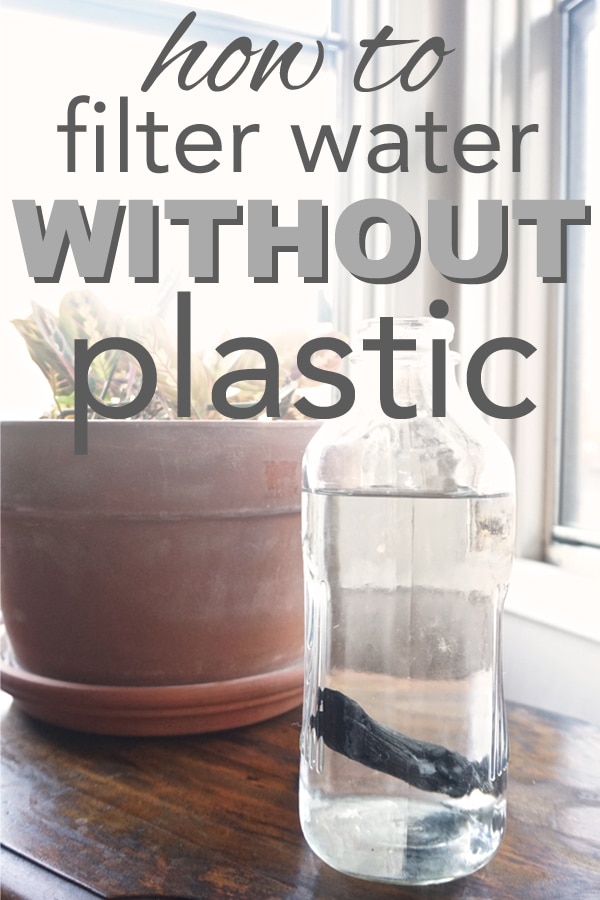
Almost all the mainstream water filter systems have plastic in the equation. But what if I told you there are ways to filter water without plastic?
Here are my top four favorite methods for filtering water using non plastic water filters!
Table of Contents
activated charcoal filters
Brita pitchers, fridge filters, and most all water filters use activated charcoal to filter water. That’s because activated charcoal absorbs impurities by binding them chemically to the surface of the charcoal filter.
Instead of using plastic charcoal filters, like Brita pitchers, I just use an entire activated charcoal stick. It works the same as every other filter, just in a different form.
how does it work?
Place the activated charcoal stick in a glass carafe full of tap water and let it sit for several hours. Don’t use a plastic jug; it really needs to be glass or stainless. I use an upcycled glass milk bottle.
Activated charcoal naturally bonds with toxins. The sticks remove mercury, chlorine, copper, and even lead. It does not remove fluoride. So, don’t worry! I am getting plenty of fluoride without having it in my toothpaste.
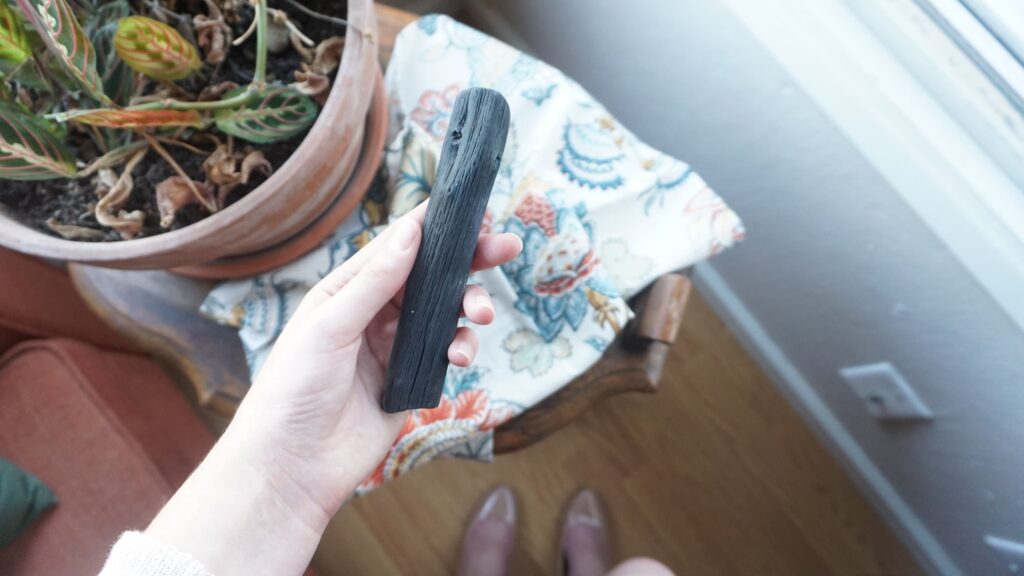
how long does it last?
They last around 4 months. They do take a little bit of maintenance. Every 3-4 weeks the surface will fill up with toxins. You need to release the toxins so it will keep working. It’s very simple. Just boil the stick for 10-15 minutes, discard the water, and it’s ready to use!
what happens after four months?
Compost it or use it as a deodorizer. I keep one under Nala’s kennel. You could keep one in the fridge, by your shoes, or any other place you need to help control odor.
There are several options out there, but I like this one and this because their packaging is compostable.
There is nothing wrong with Brita pitchers. It is still wayyyyyy less waste in the long run than buying bottled water. But, once your Brita pitcher is no longer in working condition, consider switching to this eco-friendly option. Plus, it will save you a lot of money! Brita refills aren’t cheap.
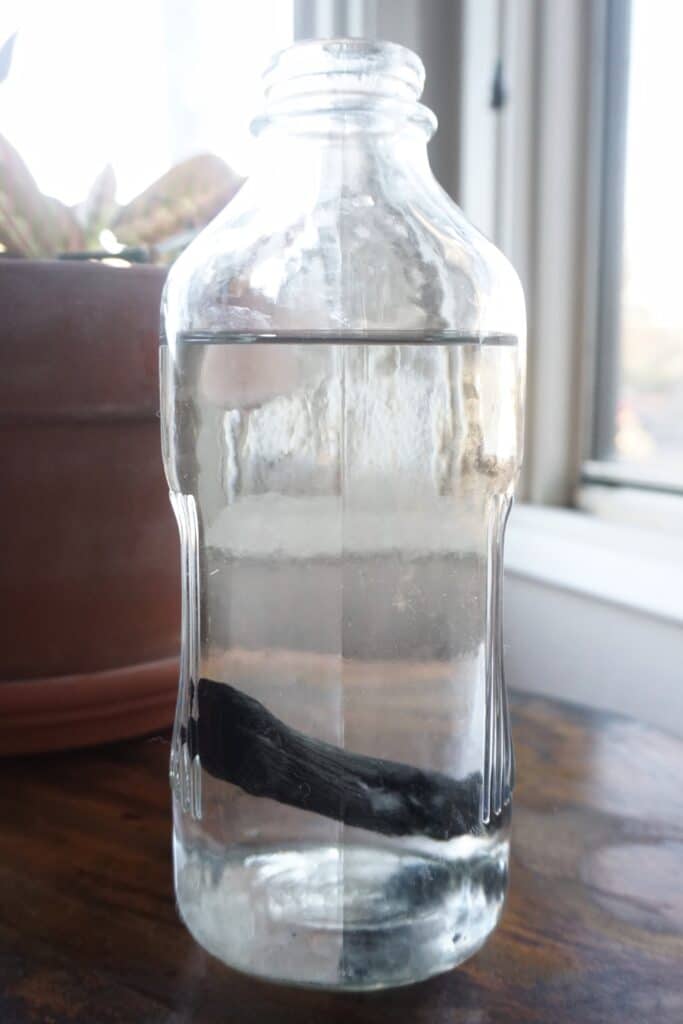
berkey
I’ve tried the Berkey water filter and it is definitely a good option if you drink a lot of water and have optimal counter space.
The Berkey water filter is made from stainless steel and sits on your countertop. You use it kind of similar to a water dispenser.
They offer several different size options from travel berkey (their most compact option, can fit 1.50 gallons) to their crown berkey (can hold up to 6.00 gallons)!
Each Berkey, no matter the size, comes with two black water filters that’s recommended for replacement every 3,000 gallons of use. After your initial purchase, you will only have to purchase refills.
I personally enjoy using the Berkey because I drink a lot of water. Plus, it’s great for when guests come over! I never have to worry about refilling it because it holds so much water.
While it’s not the most affordable option upfront, this sustainable water filter is sure to save you money in the long run.
Berkey vs. Brita: This is definitely a more expensive option and a bit more complicated to assemble. But in my opinion, it does a much better job of filtering water than Brita. Plus, I don’t have to worry about my water sitting in plastic, as Berkey is made from stainless steel. It’s also wonderful for parties and large get-togethers!
soma
I’ve also tried the Soma water filter and LOVE that Soma filters are made from 60% plant-based and renewable materials.
Through the power of activated coconut shell carbon and charcoal, the Soma filter protects your water from Chlorine, Mercury, Zinc, Cadmium, Copper, and other unwanted tastes or odors.
You can buy a pitcher, or the carafe. The pitcher is designed using BPA-free plastic and an eco-friendly bamboo handle. The carafe is made from shatter-resistant, borosilicate glass and holds 6-cups (48 oz.) of filtered water.
Each pitcher and carafe comes with a complimentary filter to get you started. You just have to replace your Soma filter every two months.
Plus, every time you buy a Soma product, they donate to charity: water projects. These contributions go directly to sustainable, community-owned water projects in developing countries.
Soma vs. Brita: This is a great option for those who prefer water filters that can be stored in the fridge and are plastic-free. I love the fact their carafe is glass. Their pitcher option is very similar to Brita’s so there’s little to no learning curve – though their filters are superior in my opinion.
larq
Last but not least, I did try out LARQ’s water filter too, but I ended up giving it to one of my friends who needed a water filter. Now she doesn’t drink from water bottles anymore, so that’s a win!
I specifically tried the LARQ Pitcher PureVis, which is an advanced water pitcher with 2-step filtration and purification that takes seconds to sanitize drinking water.
LARQ uses innovative plant-based carbon-derived filters to improve the health and taste of water quickly and easily. These filters are effective at removing pollutants like lead, chlorine, PFAS, pharmaceuticals, VOCs, pesticides, cadmium, and more.
PureVis in particular eradicates bio-contaminants like bacteria too. It purifies water automatically, both on refill and every 6 hours to prevent bacterial and bio-contaminant growth inside the pitcher.
LARQ vs. Brita: LARQ certainly has a superior filtering ability, and takes into consideration bacteria. It’s self cleaning and can filter out more contaminants than Brita can. It’s got a seamless, easy-to-use design similar to Brita’s so there’s little to no learning curve.
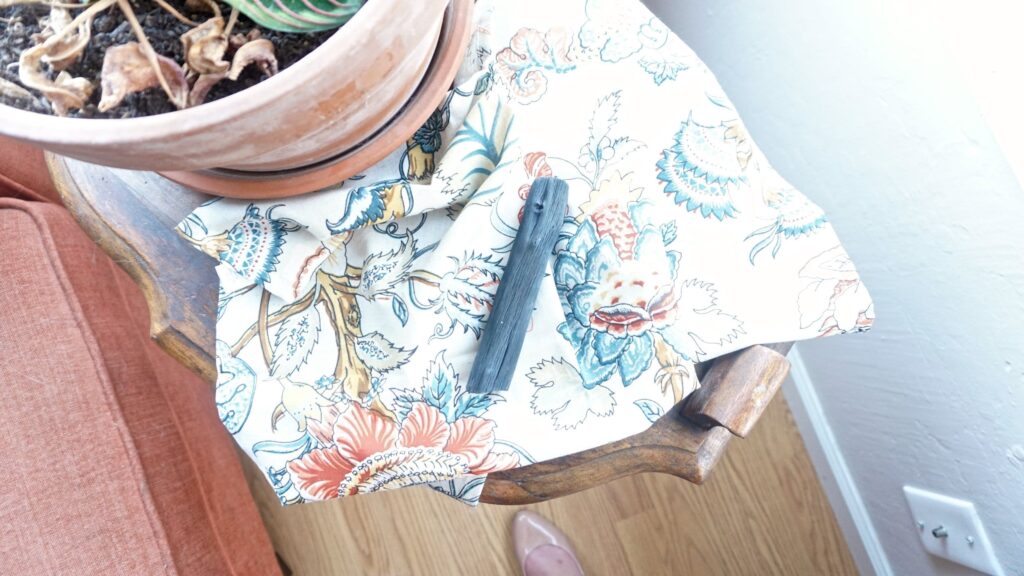
conclusion: my top picks
While all of these water filters are great, if I had to choose, I’d say Berkey is the best for on the counter storage and LARQ is best for in the fridge/limited space.
Berkey takes up a lot of room, so it’s not ideal if you don’t have a lot of countertop space. Still, it’s the option I wound up going with and I use it to this day to filter my water.
LARQ is a great option though for those with limited space, or those who prefer smaller pitchers.
So, what do you think of these zero waste water filter options? Let me know in the comments!
This post may contain affiliate linking you can read more on my disclosure page.


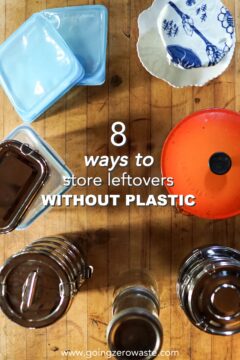
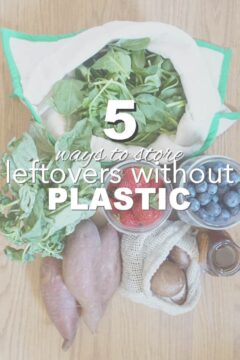
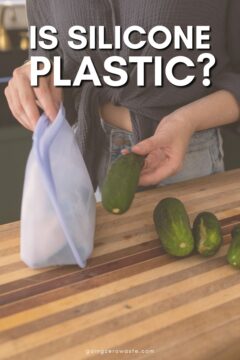




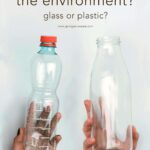



Our water is fairly hard, too. We drink tap water nonetheless. For our #1 drink black or green tea, we use a Brita filter – it does make a difference in the taste of the high-quality tea. The think about coal filters is that they are a bacteria hotbed. After a few days, bacteria accumulate and spread there. Since we boil all filtered water, this makes no difference to us. the straight tap water has a bit of an odd taste: this comes from all the particles in the natural water. Since I prefer these non-toxic particles to lots of bacteria, I live with the odd taste. I do not use bottled water at all, even though in Germany we have good glass-bottled water besides the PET-bottled water. Both glass and PET bottles are recycled but the cost of shipping and cleaning the glasses or of shipping and melting the PET into a down-graded material are immense. No point to it in my opinion.
Friends like sparkling water, which can be bought in glass or plastic. If they really wanted to, they could use a sparkling machine, i.e. a machine that fills the water from the tap into a bottle and adds gas to it.
The only downside here s that you cannot order tapwater in pubs and restaurants. If you have a meal, you may ask one and sometimes get it. Mostly, they want to charge for sitting down and insist you consume something. Tapwater is not considered a sellable item in pubs.
I like your idea with the coal stick. However, I wonder whether bacteria aren’t an issue. Four months is a long time to grow happily if you are bacteria… ?
If you’re keeping the water in the fridge you shouldn’t have a problem. We go through one of these pitchers twice a day? You release the toxins by boiling it every 3-4 weeks. If you’re really worried about it, I’d boil it every week.
Love this idea. I’m still using a Brita but when my filters run out I want to try this. Is it essential to remove the stick from the water after a few hours or can it be left in over night? I usually refill my Brita twice a day, so would it be okay to just leave the stick in all the time for convenience?
You only need to take it out when you boil it to rejuvenate it. Other than that, it’s fine to stay in the water bottle!
After you boil it to rejuvenate it how long should i wait until I put it back in my water jug?
I typically put it on the drying rack with my dishes and put it back in the water after dry, but I’m not entirely sure that’s necessary….
This is not as good as reverse osmosis, the water you filter contains other chemicals and contaminants (public water). The reverse osmosis under-sink systems are not plastic free, even though they tout being "BPA" free. Plastic and containers in genera contain "BPS" as a replacement (and who knows what else), and other toxins. Surgical grade (316) stainless steel, and glass are really the only truly safe containers I could think of. I’m having so much trouble finding something to solve this issue. This Binchotan charcoal filter is great for some water sources, but not for tap water.
-Sue
Reverse osmosis is the most reliable filtration possible.
-Sue
hello just saw this post. I have always been told that consuming flouride was detrimental to health? Wondering if there are any ideas on combating the flouride in water as well
First check to see if your area puts fluoride in the water. Not all do. I believr reverse osmosis removes fluoride.
Don’t be so smug about Arkansas water – just because the water is "spring fed" doesn’t make it pure. Read this: https://www.theguardian.com/environment/2017/sep/06/plastic-fibres-found-tap-water-around-world-study-reveals
Basically we’re all drinking plastic.
I didn’t realize reminiscing about the water back home made me smug.
You say you let it sit for several hours, can you be more specific, please? I saw sticks you can put into your water bottle, is it going to get filtered in short time or is it better to leave in jug and after several hours pour water to the bottle?
ZeroWater filters deionize the water; remove all types of organic matters like heavy metals such as chromium and lead. There are many benefits of using a filter pitcher on the refrigerator shelf. It can filter water same as the reverse osmosis system which is one of the most compelling options in the present market. http://www.ewaterpurifier.com/best-zero-water-reviews/
This is probanly a silly question, but if you compost the charcoal after 4 months, aren’t you putting the removed chemicals into your compost pile? ?
That’s an interesting point. I wonder….
I guess boil it well before composting!
I’ve been using the charcoal sticks, two in a glass gallon of water. I was traveling by car and noticed a lot of black bits on the bottom. Is it from the agitation? Is it unsafe to consume since the charcoal holds the toxins?
Why do they only work for a few months? Is there a definitive way to tell when it’s at the end of its life?
I do love the idea of this. I’m also considering though, that in a Brita, all of the water is being forced through the charcoal filter. How can we be sure that the method you described is safe for effective? I want it to be!
Best, Donna
I use a Kangen water ionizer that has charcoal filter ,but also ionizes the water trough electrolysis and makes is alkaline and antioxidant. I use the different ph waters for cleaning,drsinfecting, washing produce, laundry, skin astringent..etc.
Truely an eco friendly technology.
vpaneva.enagicweb.info
I am definitely going to give this a try!! My doctor keeps insisting that I only drink alkaline water, which only comes in plastic bottles, and the only other way of getting it would be through a $5,000 machine.. ?
I’m going to try ditching the Brita and replacing it with your method!
All water is alkaline. Do NOT fall for that $5000 machine. That’s crazy. All you need is the little alkaline strips to test your water and your (pardon me) pee. You may remember these from science class – I found some here for you — but you can usually get them at health food stores – https://www.webstaurantstore.com/hydrion-93-s-r-insta-check-ph-test-paper-dispenser-level-0-13/37393.html
We have a system called a Birky (metal container) which I really like. It has large charcoal filters that you need to shave every couple of months and then replace. It also has another filter you can purchase to remove other chemicals that charcoal can’t if you want. The only downside is the second filter is made of plastic but depending on the water, you may not even need it.
I love it because we drink 6 or 7 litres a day in our house and this system can keep up with us!
I was wondering, why can’t I use a plastic jug to contain water and filter it there? I wouldn’t buy a plastic option now, but I have two old plastic jars that I don’t want to throw away, but reuse. Is there any reason for this other then don’t buy plastics?
Impressive review. I also maintain a site named eWaterpurifire. You will get more details for here- https://www.ewaterpurifier.com/pur-vs-brita-water-filter/
Can we use the charcoal stick uses for sketching for filtering water too?
thats a different type of charcoal, but that would be cool!
So do you have to wait several hours to use the water you’re filtering in the glass jug with the charcoal stick? Should you have a separate glass jug you move the filtered water to once it’s done so you can continue the process of filtering more? Just wanting more clarification on what you do with the water once it’s filtered.
What Carbon Filters Remove
Carbon filters are very effective at removing a number of deleterious chemicals, reports the Home Water Purifiers and Filters site. These include chlorine, benzene, radon, solvents trihalomethane compounds, volatile organic chemicals such as pesticides and herbicides and hundreds of other man-made chemicals that may come into contact with tap water as it proceeds through the system. In addition, filters remove bad tastes and odors from the water.
What Carbon Filters Don’t Remove
Carbon filters are not particularly successful at removing dissolved inorganic contaminants and heavy metals such as minerals, salts, antimony, arsenic, asbestos, barium, beryllium, cadmium, chromium, copper, fluoride, mercury, nickel, nitrates, selenium, sulfate, thallium and other contaminants, which may require a reverse osmosis system or distiller instead. Carbon block filters can remove some large, dangerous microorganisms, such as giardia and cryptosporidium, that can cause a number of diseases and epidemics, but nothing less than the size of the carbon itself. Viruses are too small to be removed by carbon, as they usually range between 20 and 400 nanometers in size, according to the University of Oregon.
I feel like I could definitely give this a go… but how long does it need to be in the water for, for it to have sufficiently filtered the water…
And do some research on Flouride. It is not good for us. It shuts down the Pineal Gland which is ultimately our intuition. Not good. And it turns out it’s not even good for our teeth, it actually contributes to decay. Just do some research.
Love your posts ! Keep up the good work!